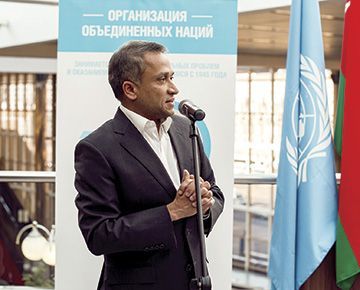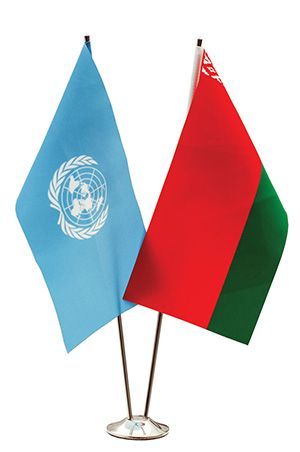
For countries such as Belarus it is objectively difficult to be one of the leaders of the global politics. There are obviously much bigger players around backed by different traditions and weight categories. But no one can reproach us for intentional inaction. The country has always been open and keen to express its position on the issues of concern to the international community. Besides, Belarus has been repeatedly putting forward its initiatives at the rostrum of the UN headquarters that by the way have been supported by its partners. At large, the cooperation between Belarus and the United Nations deserves to be viewed as constructive from different standpoints. This message is, by the way, well confirmed by the proactive and meaningful work the UN Office in Belarus does. A quick look at the past year is enough to see this. This year also promises to be very eventful. 2016 is a year United Nations Secretary-General Ban Ki-moon is expected to come to the Republic of Belarus.
“We, the peoples of the United Nations, determined to save succeeding generations from the scourge of war, which twice in our lifetime has brought untold sorrow to mankind...” These are the words with which the United Nations Charter begins, of an institution whose foundation is believed to be one of the major outcomes of World War II. In 2015, the United Nations whose aims since then have included prevention of global conflicts between nations and that at present covers almost every aspect of the life of the mankind on the planet in its attempt to achieve equality and justice for all, celebrated its 70th anniversary. But it is not only the UN’s seventieth anniversary the year of 2015 will be best remembered for by the world community. We witnessed a historic event as a result of numerous consultations and discussions including those in Belarus — adoption last September at the UN General Assembly of the 2030 Agenda for Sustainable Development along with a set of seventeen sustainable development goals.
In some way or another, in 2015 the UN interventions in all the countries covered challenges of sustainable development. And Belarus was no exception there. On the contrary, it is our country that can boast of one of the most exciting campaigns ever devoted to these two key events: the United Nations’ 70th anniversary and the adoption of the Sustainable Development Goals.
Let’s take a look back at the history. Since the UN’s founding in 1945 Belarus foreign policy has been tightly linked to the United Nations. The Byelorussian Soviet Socialist Republic was one of its founding members. On April 27, 1945 the founding conference held in San Francisco took a decision to include the Byelorussian SSR into the list of the first original members that founded a new international organisation to pay tribute to the invaluable contribution the Belarusian nation made to defeat fascism, respect and commemorate millions of people who sacrificed their lives for freedom of not only the Belarusian nation but of many nations of Europe that were under the Nazis heel. Besides, Belarus also was the first post-Soviet country to open in May 1992 in its capital the United Nations office. Therefore almost since the very formation of the independent Belarusian state, the United Nations has been represented in Belarus. Its work in the country includes a wide number of challenging areas: climate change, environmental protection, energy efficiency, migration, economic development, human trafficking, democratic governance, human rights and many others. With its support and actions Belarus has helped the United Nations to gain a stronger footing both at the national and international level. Significant joint projects and productive cooperation for about three decades make it possible to talk about outstanding successes reached.
As regards the most recent events confirming close cooperation, they apparently include a visit of Belarus President Alexander Lukashenko to the UN headquarters in New York which is well known to have hosted the summit to take place on September 25 resulting in the adoption of the Sustainable Development Goals until 2030. It is important to note that in his speech at the Summit Alexander Lukashenko stressed there is a link between any nation’s progressive development and peace and security. It can be viewed as an official message sent by Belarus of its readiness to cooperate with the UN and the international community at large for the implementation of its global commitments.
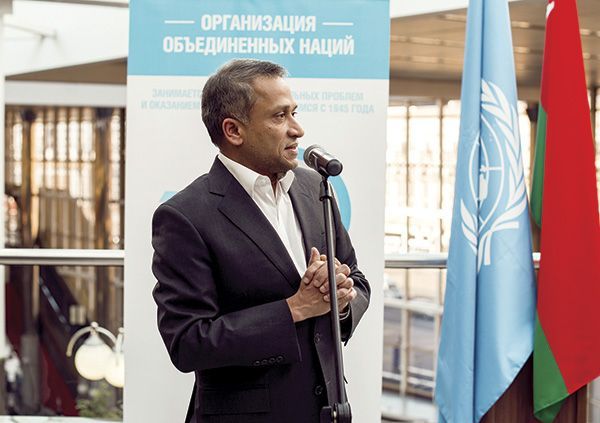
Sanaka Samarasinha, UN Resident Coordinator in Belarus
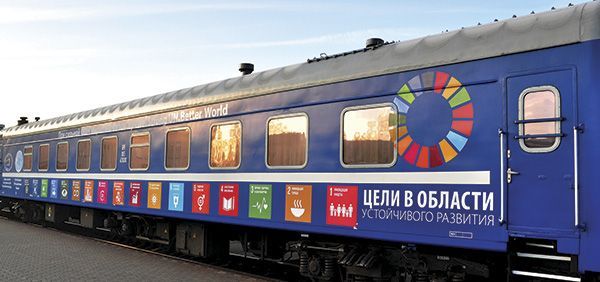
It is the summit in New York indeed where these 17 Sustainable Development Goals were adopted. In order to make a reality there will be three most important prospects over the next fifteen years: to eradicate extreme poverty, to fight inequality and injustice and to take all possible efforts to mitigate climate change.
Like previous years, 2015 was very rich in events held in Belarus under the UN auspices. They were conferences devoted to technical cooperation for development, HIV prevention, quality of asylum systems. They also included creative works competitions — peace art and essay contests. They also included workshops, exhibitions, lectures, dozens of speeches and hundreds of meetings. The visits to our country of Mr. Wu Hongbo, the Under-Secretary-General for Economic and Social Affairs, Mr. Michel Kazatchkine, UN Secretary-General’s Special Envoy on HIV/AIDS in Eastern Europe and Central Asia, Ms. Cihan Sultanoglu, Assistant Administrator of the United Nations Development Programme and Director of the Regional Bureau for Europe and the CIS, Mr. Ahmad Al Hindawi, UN Secretary-General Envoy for Youth, Ms. Zsuzsanna Jakab, World Health Organisation’s Regional Director for Europe and a number of other dignitaries representing the United Nations system did not go unnoticed.
Over the next fifteen years 193 UN member states are believed to take great efforts to achieve a set of sustainable development goals adopted in September 2015. One of the key roles in implementing these goals and changing our world for the better is no doubt played by the youth. Today’s youth are a quarter of the world`s population and of course largely determine today’s social and economic development laying the foundation for the planet’s future. Compared to previous generations, today’s youth reach maturity, both physical and social, at earlier ages, , they are known to set high expectations for themselves and for the society in which they live. Young people are known to have a growing interest in the ways to improve the world. Young people, as never before, are actively connected to each other. One of the reasons is new media and globalisation. Young people have the potential and power to change the world for the better. They apparently have the capacity to curb the problems our world is facing today or will face in the future and solve them.
The year of 2015 is known to have been declared the Year of Youth in Belarus to develop creative, scientific, and professional potential of young people, get them involved in social and economic changes in Belarus. In addition to active engagement of this most proactive group of the population in numerous activities, which is one of the priorities of the United Nations office in Belarus, it is worth mentioning an official ceremony held in July to nominate members of the UN Youth Advisory Panel. The Youth Advisory Panel is basically a new project and as such it is a consultative body which will, if required, make recommendations to the UN organisations on the issues of youth and participate in the activities of UN agencies affecting young people. Understanding the relevance of the statement that young people should have a voice in all matters that affect them — whether education, science, culture - the creation of the UN Youth Advisory Panel was a starting point for making this idea a reality.
And apparently the most memorable event of the last year is UN-70 Belarus Express for Sustainable Development Goals, a shared initiative of the UN Office in Belarus and the Ministry of Foreign Affairs of the Republic of Belarus. This initiative got possible through the experience of the "Beijing Express" sponsored by the United Nations Development Programme (UNDP) in 1995 when 200 women representing the countries of Eastern Europe and the Commonwealth of Independent States travelled aboard from Warsaw to Beijing to take part in the UN Fourth Global Conference on Women.

UN-70 Express in Belarus aims to expand Sustainable Development Goals (SDGs)

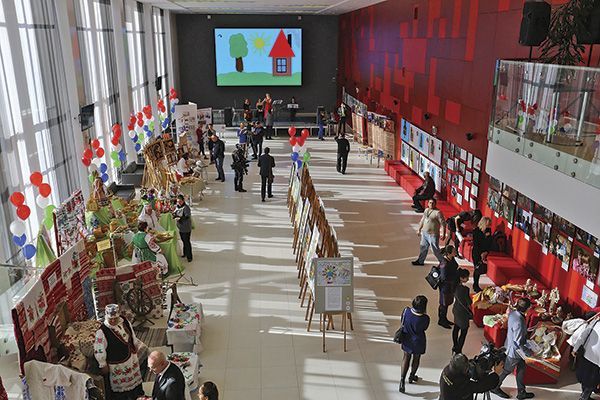
UN-70 Belarus Express for Sustainable Development Goals was officially launched at the Tree-of-Peace planting ceremony. In many cultures around the world planting of a tree is a symbol of universal peace and hope. White blossoms of a weeping cherry (this tree was planted in Loshitsa Park in Minsk) in its turn symbolise purity (virginity) and rebirth.
A weeping cherry has been selected as a symbol of mourning for the fallen. For generations to come, this delicate and graceful tree will serve as an enduring symbol of harmony and unity. As is the case with the world community, a weeping cherry requires careful and steadfast nourishment. And only by virtue of unwavering care and attention this tree, much like peace, will grow strong, robust and resilient. We will be able to watch the weeping cherry grow and bloom in Loshitsa Park in Minsk for many years ahead.
By the way, the ceremony attended by President of Belarus Alexander Lukashenko, Cihan Sultanoglu, Ahmad Al Hindawi, UN Resident Coordinator in Belarus Sanaka Samarasinha and numerous representatives of the UN, the diplomatic corps and the government mirrored a similar event initiated by the Republic of Belarus that took place on May 5, 2015 at the UN’s headquarters in New York.
The same day also became a key moment with regard to the prospects for cooperation between the United Nations and the Government of Belarus over the next five years: signing of the United Nations Development Assistance Framework (UNDAF) for the Republic of Belarus for 2016-2020. The document is a very important tool for defining a joint strategy of the United Nations organisations in Belarus. It was prepared by the UN Country Team in Belarus in consultation with the Government of Belarus, civil society, the private sector, vulnerable groups, national and international partners with the aim of promoting and protecting human rights in the country and improving lives of the people of Belarus.
The UNDAF is designed to support the achievement of the national development priorities in the field of sustainable development of the Republic of Belarus based on increasing economic competitiveness, innovation development, structural reforms that ensure knowledge-based economic growth and human capital development, responsive and accountable governance, environmental protection and sustainable management of natural resources. Promotion of gender equality and human rights in line with this human rights-based approach are the overarching principles streamed across this Framework Programme.

UN Youth Advisory Panel
The UNDAF focuses on four strategic areas of response, which are in line with the mandate of the UN, and key national priorities outlined in the National Strategy for Sustainable Socio-Economic Development in the Republic of Belarus until 2030. It should be noted that the strategic areas will set the main direction and scope of action of the UN’s development assistance to the Government of the Republic of Belarus over the next five years and include:
• Inclusive, responsive and accountable governance;
• Sustainable economic development;
• Environmental protection and sustainable environmental management based on the principles of green economy;
• Sustainable development of human capital: health, education, social inclusion and protection, comprehensive post-Chernobyl development.
Please, note that the difference between the two Framework Programmes is essential. This applies both to the content of the documents and the process of their preparation. The first UNDAF was inspiring in its nature and had very ambitious goals, targets and scope of financing. Cooperation with partners from the Government was the main focus. The new Framework Programme is to a larger extent more inclusive. The process of its formulation gathered non-governmental organisations, private sector and, most importantly, groups that will seek assistance as part of the Programme including entrepreneurs, persons with disabilities, refugees, HIV-infected persons. It was developed as a result of numerous consultations, discussions and negotiations.
Another significant difference of the new UNDAF is that it includes only those strategic areas of response the implementation of which involves efforts of many UN agencies rather than one. All the four strategic areas of the UNDAF, similar to eight outcomes, are well linked together: no goal can be achieved without reaching the others. Four strategic areas of response of the Framework Programme reflect both national priorities outlined in NSSSED-2030 and the five-year Programme of Social and Economic Development, but also reflect 17 Sustainable Development Goals signed by the world leaders and President of Belarus Alexander Lukashenko in September 2015 in New York.
After a short excursus, let us come back again to the ‘UN-70 Express’. After its departure on October 23 from the Minsk Railway Station, the UN-70 Express visited Grodno, Baranovichi, Brest, Gomel, Mogilev and Vitebsk. This 8-day UN journey around the cities of Belarus involved twenty government agencies, 33 embassies, representatives of over 45 countries, 246 UN staff, 19 UN agencies and partners, 150 non-governmental organisations, 25 private sector partners, 15 universities and 9 schools including the OSCE, the EU, the Global Fund, Maria Sharapova Foundation, the US Agency for International Development and a number of media partners. To that end, the events held aboard and in the cities were attended by over 150 thousand people.
In each city we covered different SDGs. Good health in Grodno; quality education and gender equality in Brest; reduced inequalities in Gomel; no poverty, zero hunger, decent work and economic growth, sustainable cities in Mogilev; affordable and clean energy, responsible consumption and production, climate action in Vitebsk.

UN-70 Express visits Mogilev
The UN-70 Belarus Express for SDGs mission was to bring people together and to give them a chance to talk to and hear each other. We are confident to say throughout the history of the UN’s presence in Belarus, this campaign has been the largest outreach projects, but at the same time the most vivid demonstration ever of how the Government and the UN can work together to get tangible benefits for the society.
The journey of the UN-70 Express finished on October 30 in Minsk. There still was some time left until the end of the year indeed. It was still the time of active work. To that end, on November 20, Universal Children’s Day, the UN in Belarus launched an information campaign ‘Inclusive Belarus: SDGs for all’ to help fight fear and stigma and give hope to all those who feel excluded from the society they live in. The culmination of the campaign coincided with the Human Rights Day celebrated annually in December. On this day, a number of experts and professionals in their respective areas got together to discuss the implementation of the outcomes of the Universal Periodic Review at the international seminar in Minsk. The Universal Periodic Review is a unique process which involves a comprehensive review of the human rights records in all the countries of the world. Belarus, in its turn, went through the second cycle of the Universal Periodic Review in May 2015. The international seminar became a platform for discussion and sharing views and best practices.
The information campaign ‘Inclusive Belarus’ finished on the International Migrants Day which is also celebrated in December. Today, globalisation and advances in communications and transportation have resulted in a significant increase in the number of people willing and having capacity to move to other countries. The new era has opened up new opportunities and at the same time has also posed new problems and challenges for the communities worldwide. The staff of the International Organisation for Migration and the UN Office in Belarus joined the international campaign ‘Candlelight Vigil’ to commemorate the lives of the migrants who had lost their lives and pay tribute to the suffering they face on a daily basis.
Last year was very important on the planet. The world celebrated the 70th anniversary of the end of World War II and the foundation of the United Nations. At present, while heading for the future, many are pinning their hopes on the new Sustainable Development Goals and their achievement.
The year of 2016 promises to be no less eventful. One of such largest events will apparently be the international conference ‘Chernobyl Accident and Society: 30 Years after Catastrophe’. Supported by the UN in Belarus, the conference is planned to take place in April and its main objective will be to promote further cooperation in overcoming the consequences of the Chernobyl disaster and sustainable development of the affected areas.
UN Secretary-General Ban Ki-moon is also expected to visit Belarus this year. The UN Secretary-General received an official invitation from Belarus President Alexander Lukashenko at the Summit on Sustainable Development and the 70th anniversary session of the UN General Assembly. The exact dates of the visit are still unknown. While the suitable moment for this visit could be April when Minsk will host the conference on the Chernobyl disaster.
Besides, in 2016, the United Nations Development Programme will celebrate its 50th anniversary of its founding. Specifically in Belarus the UNDP has been operating since 1992. In accordance with the Agreement with the Belarus government, the main purpose of the organisation is to support and supplement the national efforts at solving the most important problems of economic development and to promote social progress and better standards of life.
To this end, this year, no doubt, promises to become another year rich in good deeds of the UN in Belarus.
By Vladimir Mikhailov









